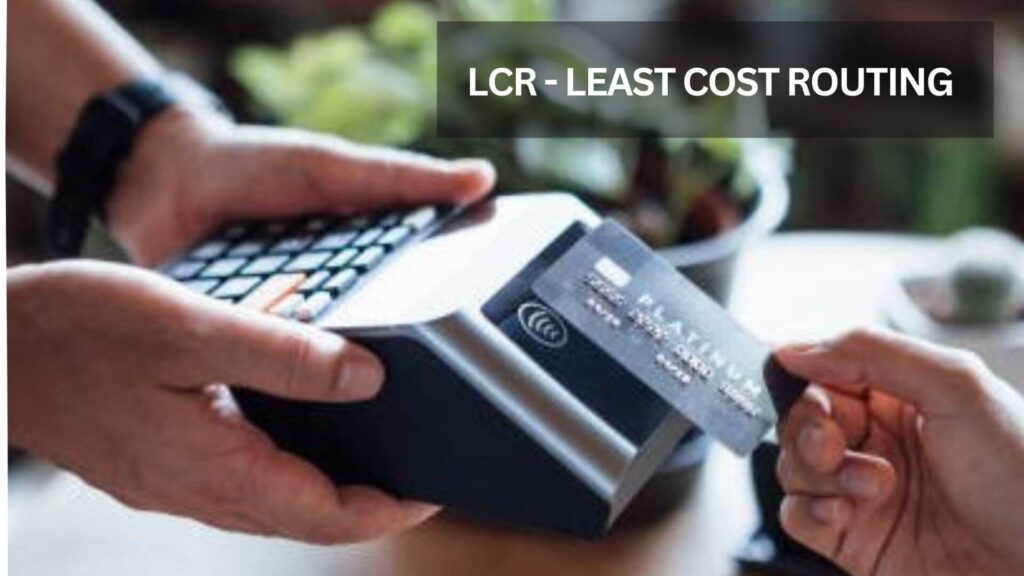4-Month Free Trial Test & Validate your 3DS Products & Authentication Flows with our Free 3DS Sandbox Environment.
4-Month Free Trial Try our 3DS Sandbox Environment.
4-Month Free Trial Test & Validate your 3DS Products & Authentication Flows with our Free 3DS Sandbox Environment.
4-Month Free Trial Try our 3DS Sandbox Environment.

Least Cost Routing (LCR) or merchant-choice routing is when a payment is processed using the cheapest option for a retailer when a consumer performs a contactless dual network credit card payment. LCR can be done via Visa, Mastercard, or EFTPOS.
Debit cards permit individuals to purchase items or cash withdrawals directly from their deposit accounts. These accounts are offered by credit unions, banks as well as building societies. It doesn’t matter what the method of processing will be (either Visa, Mastercard, or EFTPOS) the transaction will be debited from the same account for deposit.
But, based on what of these three networks manages the transaction and the amount the retailer has to pay their bank to accept the debit card transaction could alter. The EFTPOS network is often less expensive for retailers than payments that are processed through international networks, such as Mastercard as well as Visa.
The majority of debit cards used that are available in UK come with dual-network cards that are dual-network. They are cards that pay using either EFTPOS or one of two networks in the world. The two global networks are Visa as well as Mastercard and each has its own logo on one side of the card, and an EFTPOS logo on the other side. Whatever the customer’s choice of which network they pay with the transaction is taken out of the same account for deposit. The only difference is that a different route is chosen to reach the customer’s account.
The Least Cost Routing is anticipated to reduce the cost of payments through (1) providing merchants with the possibility of routing dual-network debit card transactions to the network with the lowest cost in addition to (2) expanding the competition between debit card payment providers which means there’s an increased motivation for each scheme to reduce the interchange fees, costs and scheme fees that they charge on debit card transactions. These fees are an essential element of the cost that merchants must pay to accept payments from cards.

The primary goal for Least Cost Routing is to cut down on the price of payments in the economy. There are two ways to accomplish this:
It allows businesses to transfer debit card transactions from two networks to the network that is the least expensive.
It allows for more competition among the debit card payment providers which increases pressure on all card companies to cut down on charges for schemes and interchange they charge on debit card transactions.
These costs significantly impact the amount businesses pay to accept debit cards.
The UK Reserve Bank’s Payments System Board is responsible for ensuring the effectiveness and competitiveness of the UK Payment System. As per this policy, the Board favors providing consumers with dual network cards, and also providing retailers with these lowest-cost routing capabilities.
The Reserve Bank has been observing the development of the industry in the ability of businesses to transfer dual-network debit card transactions that are contactless to the one that has the lowest processing cost. Although the majority of banks and payment processors in UK were aware of a certain version of LCR in the middle of 2019 the actual implementation of the system is modest. The reason for this is a lack of awareness and promotion of the benefits of LCR.
At the end of 2022, all payment intermediaries and acquirers that offer merchant’s credit acceptance services will be required to provide LCR for both in-person and online transactions to their respective merchants.
In addition payment intermediaries report their LCR services and their implementations to banks at least every 6 months. Banks are also required to sign non-binding agreements with other international programs.
This is to make sure that merchants don’t get affected by high rates of interchange on credit transactions made through route transactions that use EFTPOS. This will ensure that the usage of LCR is not hindered and decreases competition in the market for credit cards.
However, in June of this year, a global company, Mastercard, was cited by the ACCC due to the fact that the card scheme was involved in anti-competitive behavior regarding the delivery of services for accepting debit cards. It was discovered that the company signed arrangements with more than 20 retailers to process the majority of transactions using Mastercard debit cards directly using the Mastercard network instead of other lower-cost alternatives. In the same way, similar actions were that was taken against Visa in the past the ACCC is seeking “declarations and penalties, costs and other demands” in its lawsuit which is currently being brought by Federal Court.
Presently, with a 70 percent market share of the debit card industry In the UK, Mastercard and Visa are the top two players in the market.
While lower exchange rates of merchants are connected to low-cost routing, research suggests that there have seen increases in the rates of various types of debit transactions particularly when there is no alternative to LCR.
Recent developments, such as the advancements in technology used for payments via cards have presented a number of issues for LCR. The challenges include the fact that card issuers are trying to offer debit cards that are single-network, which allows payments to be processed via one network, as well as the transition to new payment technology for card transactions like mobile wallets, in which LCR hasn’t yet been feasible. Additionally, there are concerns for merchants who are concerned that making use of LCR for debit transactions could be more expensive in terms of the interchange rate for credit transactions.
Merchants should inquire about the viability of LCR through their payment services provider. If a merchant’s current payment processor does not provide LCR it may be a good idea to investigate other providers or make upgrades to their software for payment terminals and the replacement of terminals may be required to enable LCR.
LCR (Least Cost Routing) is a method used to determine the most cost-effective way of routing phone calls. It involves analyzing, selecting, and directing the path of incoming and outgoing communication traffic based on the path that offers the best rates.
1. The default option is to process all eligible debit transactions through the Mastercard®/Visa® network if you do not activate Least Cost Routing.u003cbru003e2. You can choose to process all eligible debit transactions through the eftpos® network.u003cbru003e3. Another option is to set a threshold for eligible debit transactions based on their value and then route them accordingly.
When we say u0022least cost,u0022 we mean that the method of resolving an issue must be the least expensive option for the deposit insurer among all possible solutions. On the other hand, the u0022less-stringent cost testu0022 means that the selected method only needs to be cheaper than the cost of liquidation and reimbursing depositors’ claims.
With many years of rich experience in technology development, Logibiz Technologies aim to boost your online presence by offering 360-degree solutions related to Online Payments and its Security.
From Online Fraud Prevention solutions to White Label Payment Gateway Platform and complete 3DS testing environment, Logibiz has got your back. Additionally, we also offer consultancy services for all your EMVCo & Card Scheme certification needs.
We provide Free Demo & POC of our products which are certified globally and trusted by leading Financial Institutions worldwide.
Book a Free Consultation Call with our experts to discuss how we can help grow your online payments business.
Test your 3DS Products with a 4-Month Free Trial of our 3DS Sandbox Environment.
Try 4-Month Free Trial of our 3DS Sandbox Environment.
We provide Tailored Payment Solutions for PSPs, Payment Gateways, Banks and Merchants with a complete range of top-tier payment gateway platforms, robust authentication solutions, and cutting-edge testing tools.
We’ll update you on our upcoming events, newsand publications.
Test & Validate all your 3DS Products & Authentication Flows with a 4-Month Free Trial of our 3DS Sandbox Environment.
Try our solutions for free! Sign up now and see how we can help you.
Explore our comprehensive services. Download our brochure for detailed information on our offerings and solutions.
The 3DS Server provides a functional interface between the Directory Server (DS) and the 3DS Requestor Environment flows. 3DS Server is responsible for gathering necessary data elements for 3-D Secure messages, authenticating the DS, validating the DS, the 3DS SDK, and the 3DS Requestor, safeguarding the message contents. The 3DS Server also helps to protect the message content while it is being transferred to DS and vice versa.